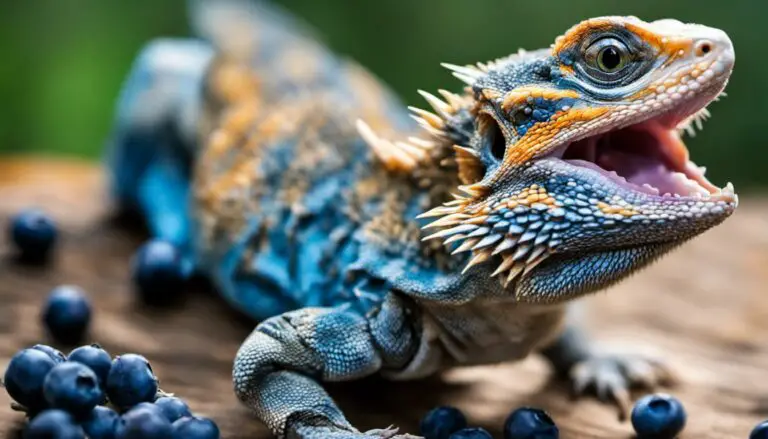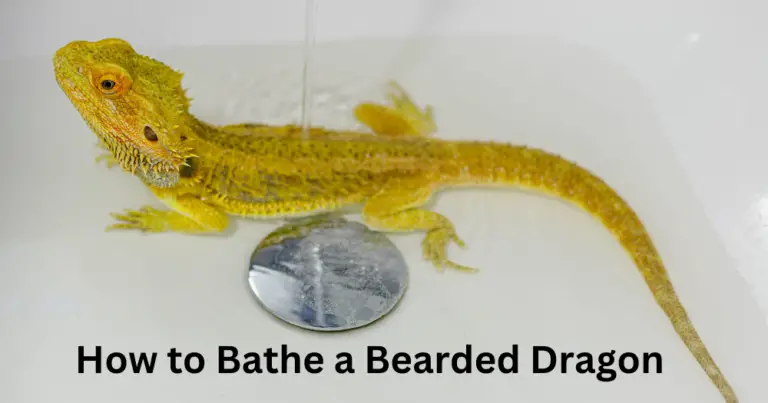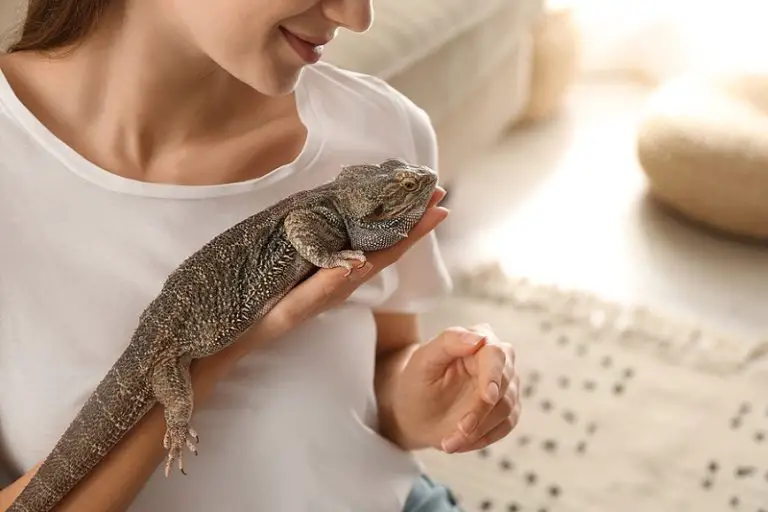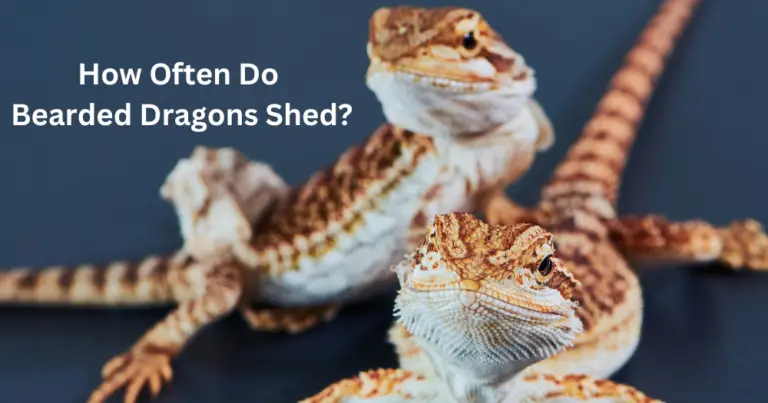Do Bearded Dragons Hibernate? Full Guide To Sleep, Brumation And More
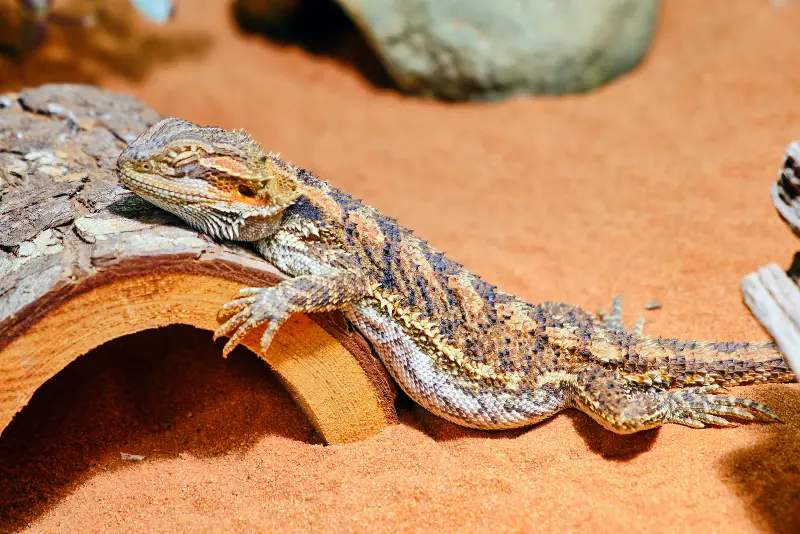
The short answer is no. Bearded Dragons do not hibernate. However, they go through a similar process called brumation. Brumation occurs in cold-blooded animals during the colder months of the year, and it may also affect your Bearded Dragon.

Contents
Table of Contents
Do Bearded Dragons Hibernate?
In this article, we’ll give a brief overview of the Bearded Dragon and the differences between hibernation and brumation.
Then, we’ll share everything you need to know about brumation. For example, we’ll answer the following questions:
- Do Bearded Dragons brumate?
- What age do Bearded Dragons brumate?
- How often do Bearded Dragons brumate?
Finally, we’ll share some information about Bearded Dragon sleeping habits, in and out of brumation.
What Is A Bearded Dragon?
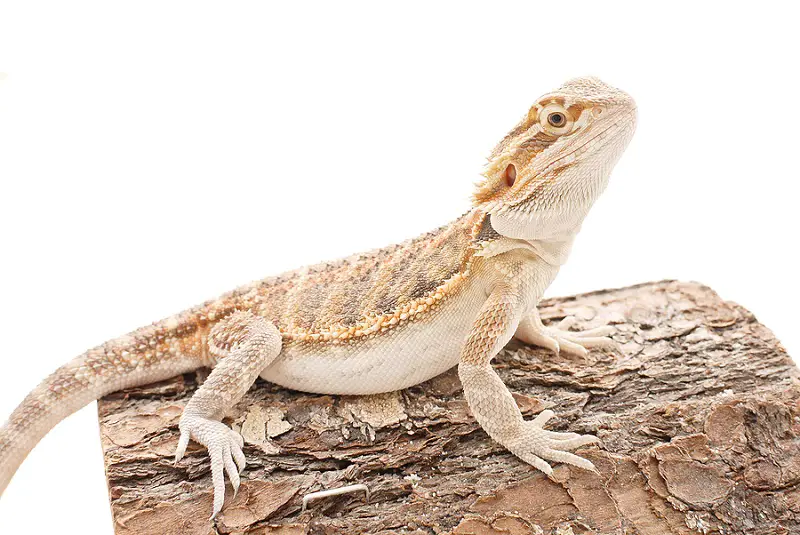
A Bearded Dragon is a type of reptile that comes in eight different species. They originally came from Australia where they’re used to dry, warm temperatures.
So, if you decide to have one as a pet, they need a terrarium that’s at least 40 gallons in size with a temperature of 75 to 85 degrees F during the day. Also, during the day, they need a basking spot that’s 95 to 100 degrees F. At night, the tank should be between 65 and 74 degrees F.
Beardies are omnivores, which means they eat vegetation and live food. As a baby, the majority of their diet should be insects. However, as they grow older, adults need more vegetation than insects.
With proper care, dieting, and exercise, Bearded Dragons can grow 16 to 24 inches long. Also, they’ll have an average lifespan of about four to ten years, but some have been known to live up to 15 years.
Overall, there’s a lot to love about this reptile, and they make excellent pets for anyone – young, old, novice, or expert. Bearded Dragons are friendly, social, and enjoy human interaction.
Do Bearded Dragons Hibernate?
Bearded Dragons go into brumation rather than hibernation. Even though the two are similar, some slight differences keep the animals alive and well during this time.
Hibernation Vs Brumation
Hibernation is a longer and deeper sleep than brumation. However, Brumation is similar in which the animal undergoes a deep sleep.
This deep sleep causes inactivity, low body temperature, low heart rate, low metabolic rate and low respiratory.
Brumation occurs in particular reptiles and amphibians who are cold-blooded. For example, bearded Dragons are cold-blooded, so they undergo brumation rather than hibernation.
What Is Brumation In A Bearded Dragon?
Brumation is a type of hibernation that Bearded Dragons will undergo. Wild Bearded Dragons will do this to survive during the colder months. For example, when the weather turns cold, food and plants may be scarce. So, Beardies go into brumation to sleep off the cold and conserve their energy for when the weather warms up again. They’ll build a burrow and sleep the cold months away, relying on the nutrients they’ve already eaten stored in their bodies.
Is There Brumation For Bearded Dragons In Captivity?
Yes, Bearded Dragons can go into brumation in captivity. However, it’s not common. No matter the weather or season outside, their terrarium will always remain warm and bright for them. So, your pet Beardie may not feel the need to go into brumation.
If they do, it might seem startling at first. But don’t worry; it’s an entirely natural process. Your Bearded Dragon knows what it’s doing, so you’ll need to know how to support it during that time.
Watch this video:
Do Baby Bearded Dragons Brumate?
There has been a misconception that baby Bearded Dragons do not brumate. However, that’s not true. Bearded Dragons, no matter their age, do brumate.
For instance, in the wild, they need to survive the colder months when food is scarce. So, babies do go into brumation.
However, this misconception is that people have wondered if babies have enough nutrients they need to go through brumation safely.
If you have a baby Bearded Dragon at home and you believe they might be getting ready to brumate, always bring them to the vet. The vet will check their nutrients, fat, and weight to ensure it’s safe for them to brumate.
In fact, this is one reason why you should call the vet when you believe your Beardie is preparing to brumate.
So, do juvenile Bearded Dragons brumate? Yes, every Bearded Dragon is different in size and weight, no matter their age, so it’s always best to double-check.

Brumation Bearded Dragon Signs
It’ll be easy to tell when your Bearded Dragon is heading into brumation. For example, they’ll show the following signs:
- Sleeping more
- Going to sleep earlier than usual
- Hiding in the shade more often
- Decreased appetite
- Going to the bathroom less frequently
It may be tempting to call the vet if you notice these signs, assuming your Beardie is sick. However, if the colder months are beginning to set in, your Bearded Dragon is simply preparing themselves to survive.
If you try feeding your Bearded Dragon and they actively refuse their food, and you notice they’re sleeping more, then chances are they’re getting ready for brumation.
However, it’s always a good idea to call your vet anyway when this happens. Not only will this give you peace of mind that they are, in fact, preparing for brumation, but you can give them a quick checkup.
You don’t want your Bearded Dragon to go into brumation when they’re sick or don’t have enough nutrients to survive the sleep. So, it’s always best to be safe than sorry.
When Do Bearded Dragons Brumate?
Do Bearded Dragons brumate in summer? No, Bearded Dragons will brumate during the colder months. Since this reptile is from Australia, they live in the southern hemisphere.
What this means is that their seasons are opposite of the northern hemisphere, or America.
In their natural habitat, Beardies will brumate when the weather turns cold. In captivity, depending on where you live, they might or might not brumate.
If they do, it’ll be during the colder months. So, for example, somewhere between October and March.
How Long Do Bearded Dragons Brumate?
Bearded Dragons can brumate for anywhere between a couple of weeks up to four months. The duration will depend on how cold your area is.
For example, even though you keep their tank at a good temperature for them, your Beardie might stay in brumation longer if the weather outside is brutally cold.
Otherwise, you can expect them to wake up within a couple of weeks.
What To Do For Your Bearded Dragon During Brumation
The first thing you’ll want to do is get your Bearded Dragon checked out by the vet. If you believe they’re preparing for brumation, you can bring in a stool sample without needing to take your Beardie out of the house.
Your vet can tell a lot from a stool sample. For instance, they can check your Beardie for parasites and ensure they’re healthy enough to brumate.
If there is anything wrong, then you can treat your Bearded Dragon before they brumate. Otherwise, you can begin to help the brumation process right away.
Reduce The Temperature Inside The Tank
One thing you’ll want to do is reduce the temperature inside your Beardie’s tank. Reduce the temperature bit by bit over a couple of weeks.
You can do this by using a lower watt bulb, or you can simply reduce the number of hours you have the basking lamp on. Eventually, there will be no heat at all.
Offer Less Food To Your Bearded Dragon
When in brumation, you don’t want there to be any food left in your Beardie’s stomach. Otherwise, it could rot, and then your Bearded Dragon may end up sick. Of course, they’ll need vet treatment, but they can recover fully from it.
So, be sure to feed them less and give them ample time to digest their food from the basking light.
If you’re still feeding your Beardie, make sure you haven’t turned off the basking light yet. Then, you can begin reducing the temperature, but keep it on until your Beardie is no longer eating and you’re sure they’ve digested all of their food.
Let Them Go The Bathroom One Last Time
Once you’ve stopped feeding your Bearded Dragon (or they begin to refuse food), wait for them to go to the bathroom one last time.
Once they do, you can be sure they’re empty. Then you can turn off the basking light and allow them to go into brumation peacefully.
Do Bearded Dragons Eat During Brumation?
No, Bearded Dragons do not eat during brumation. It sounds odd to not feed your pet for a few weeks (or even months), but it’s part of the process.
First, your Beardie will be sleeping, so they won’t be able to eat anyway. Also, if they happen to wake for a short amount of time, don’t assume they’re hungry.
They could still be in brumation, and you don’t want them falling back to sleep with a belly full of food.
Remember, if the food isn’t completely digested in their system, it might rot inside of them. Then your Bearded Dragon will wake up sick, and you’ll be taking a trip to the vet.
However, you can leave a small dish of water in their enclosure. You can change the water once every couple of days. Your Beardie may or may not drink from it, but it’s there if they need it.
In addition, keep the bowl near them when they sleep. That way, if they’re thirsty, they don’t need to walk far to get to it.
Also, make sure the water bowl isn’t big enough for your Beardie to go in. You don’t want them soaking during brumation.
How To Wake Up A Bearded Dragon From Brumation
Is brumation bad for Bearded Dragons? No, it’s a natural process. In fact, you should never wake up a Bearded Dragon when they’re in the middle of brumation.
When your Bearded Dragon is in brumation, or they’re beginning to, there’s not much you can do to stop it. It’s a natural process, so all you can do is support them.
Since they can be asleep for a few weeks or up to a couple of months, you want to let them go through the process in full.
How To Tell Whether It’s Bearded Dragon Brumation Or Dead Or Sick?
One of the best ways to tell the difference of whether your Bearded Dragon is getting ready to brumate or whether they’re sick is to check with your vet.
For example, parasites can mimic the same signs as your Beardie preparing for brumation.
If you notice your Beardie sleeping more or they’re not hungry, you can bring a stool sample to your vet. They can check for parasites and other signs of illnesses. If nothing is wrong then chances are your Bearded Dragon is preparing to go into brumation.
If your Beardie is rapidly losing weight, then you should bring them to the vet. When they’re in brumation, they should have enough nutrients in them that they won’t lose too much weight.
For instance, your Beardie might lose three to four grams during brumation. However, any more than that, and if it’s a rapid weight loss, then it’s time to call the vet.
You can periodically weigh your Bearded Dragon while they’re in brumation. You won’t disturb them. Just be sure to do it quickly and put them back in their tank as you found them.
What To Do When Your Bearded Dragon Wakes Up From Brumation?
Your Bearded Dragon will wake up on their own, and it may seem sudden. You could walk into the room and see them at the glass waiting for you, trying to get your attention.
If this happens, one of the first things you want to do is turn on their heat and UVB lights again.
You can do so gradually as you did to turn the lights off, or you can turn them all on right away. If it’s too much for your Bearded Dragon, they’ll find cover and shade within their caves and only come out when they need the heat.
Also, you can give them a bath. This will allow your Beardie to soak and also take a drink if they need to.
One thing to note is that it might take a few days for your Bearded Dragon to get back into their normal routine and to eat again. If this happens, there’s nothing to be worried about.
They’ll eat when they’re ready and get back into their routine soon enough.
What About Normal Sleep? How Do Bearded Dragons Sleep?
Do Bearded Dragons sleep a lot? Not as much as you’d think.
Bearded Dragons are diurnal, which means they’re most active during the day. So, your Beardie should be sleeping at the same time as you sleep during the night.
After 12 to 14 hours of their basking lamp, you can turn it off for the night. In the morning, your Beardie might be awake waiting for you, or they might still be snoozing for another hour or so.
How Long Do Bearded Dragons Sleep?
Bearded Dragons sleep for about 8-12 hours per night. So, you can be sure that they’ll go to bed around the same time as you and wake up around the same time.
However, they can sleep in longer for their full 12-hour sleep.
Do Bearded Dragons Breathe When They Sleep?
Bearded Dragons do breathe when they sleep. However, if they’re in a deep sleep, they might slow their respiratory rate and heart rate.
So, you might wake up and think your Beardie is dead, but they’re not. They’re just in a deep sleep.
Of course, it’s always a good idea to check, but they’re most likely so relaxed and comfortable that they fall into a deep sleep.
Do Baby Bearded Dragons Sleep A Lot?
Baby Bearded Dragons grow quickly and often need more sleep than juvenile or adult Beardies.
You can expect your baby Beardie to sleep up to 12 hours during the night and also take frequent naps during the day.
However, if they’re being lethargic and don’t feel up to eating or playing, then you’ll want to check in with the vet.
Conclusion
Overall, Bearded Dragons in captivity may go through a process called brumation. They’ll sleep the cold away for a few weeks or a couple of months.
Chances are, they won’t go through this process if you keep their enclosure at a great temperature. However, it’s a natural process, so if they go through it, don’t be worried that you might be doing something wrong.
Instead, support them through this process. Then, they’ll be ready to play again when they wake up.
Click here to learn what Bearded Dragons eat and here for what activities you can play with them. Find all our Bearded Dragon guides here or our complete guide to raising Bearded Dragons here. Interested in breeding Bearded Dragons? Read our guide here.

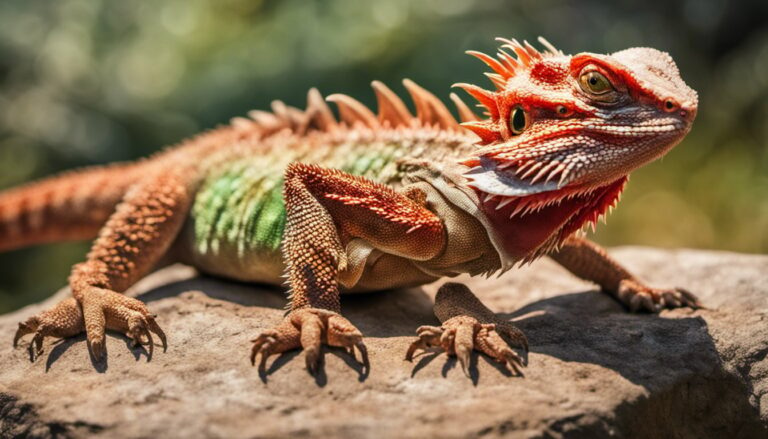
![How Many Mealworms To Feed A Bearded Dragon? [Read Now]](https://allourcreatures.com/wp-content/uploads/2021/10/How-Many-Mealworms-To-Feed-A-Bearded-Dragon-2.jpg)
